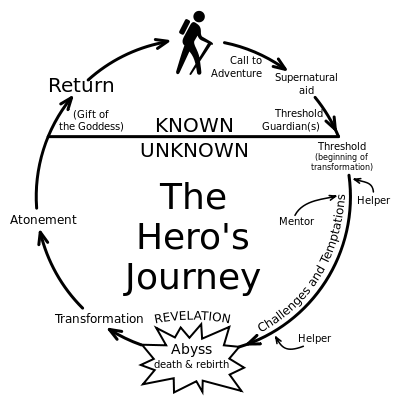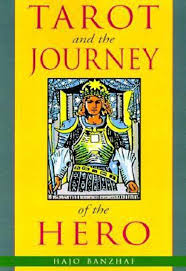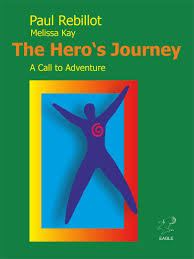I decided to open the blog with an extensive article and resources on the “Hero’s Journey“, or the “Monomyth”. I guess this will be updated regularly with more links and information, so it’s not a bad idea to check it again from time to time.
It’s maybe the topic that passionates me most at the moment, and I cannot stop talking about it. So I better cover it now, so it’s done and it will be a reference for future posts.
Online there are already a lot of very good resources on the topic, but since I will reference a lot to it in my future posts, I decided it won’t do any harm to have a page also here. Which maybe will become a collection of resources, links and contributions done by other people to the subject.
I will dedicate future posts to each stage of the Journey, so to treat each of them in detail and invite discussion and collection of more material.
So what is “The Hero’s Journey”?
It’s a general term to describe an adventure, a transformative experience, a journey that will determine change, learning and experience.
It’s used now as a general term, but it was first introduced by Joseph Campbell in his amazing work “The Hero with a Thousand Faces” , a comparative study of myths, legends and stories collected from all over the world. Campbell noted that there seems to be one single story that links us all, and called it “The Monomyth” ( = the one story), or “The Hero’s Journey”.
Campbell originally divided the “Journey” in seventeen stages. Later authors have identified more, or less (I like it with twelve phases, like the hours on the clock, as suggested by Christopher Vogler in a memo for scriptwriters for the Disney Studios), but essentially the model stays the same. And here it is, in the essence:
Basically, it’s the storyline of each movie, novel, fairy tale or myth that I have ever experienced and loved. Somebody starts small, in their everyday life where everything is under control… mmmh but maybe not quite. Then something happens that brings a change. Willing or not, our character (unwilling to be called “hero” – for now) will start a journey that will change his life, and his world, forever.
Cool uh? Could be the synopsis for any blockbuster movie nowadays, right? Well – in fact, it is.
Here a very young (and happy) George Lucas, the man behind Star Wars, says that learning about Joseph Campbell at the university gave him the original idea for the story of his movie.
But he was the first filmmaker to admit it and credit Campbell for his work; and since then it has become extremely well known (more recently, see the reference made by George Miller in his Mad Max), even sometimes to fall into some sort of a cliché. Hollywood script writers, game designers, novelists around the world refer now to “The Hero’s Journey” as a fail-proof checklist, to follow as a quality measure of their work. Which is also a danger: that it will soon become abused, and spent.
But fear not, there are good news: storytellers, no matter what sources they follow and in which era they live, were and still are divided in two broad groups: the good ones, and the poor ones.
Great storytellers will always be able to surprise and move us. They may be telling a story that is in fact 3,000 years old, but they will do it by bringing a fresh look to it, twists in the storyline, by making their characters more complex, alive and believable. Their stories will be timeless, universal, memorable. They will treat their audience like responsible, honorable, discerning people – not just passive consumers – and will lay out open the invitation for us to pick something from the story and make it ours, forever, so we can grow and be changed by it. Because that’s the main aspiration of the best stories: to live a life on its own.
Poor storytellers will maybe be able to bring the paycheck home at the end of the day, but will not be able to elevate themselves from the cliché source material they use, and their work will not be able to connect to a wide audience or to stand the test of time.
And that is why millions of people still love and talk about “The Odyssey”, “Star Wars” or “The Lord of the Rings”, but in a couple of years, no-one will remember the name of the main character of “Divergent” (it’s Tris, by the way).
Or why this is still the best selling animation movie of all times (still now from 1994, source)
while, sadly, the same cannot be said of this.

But then — What’s So Cool about “The Hero’s Journey”?
In one word: everything!
It’s a strong, universal story that is able to speak to all of us. It’s the archetype of a story, in fact (Campbell was a great admirer of the work by Carl Gustav Jung on psychoanalysis). And we love it, out of our instinct, because it’s the matter of which fairy tales, cartoons, myth, legends, and even the religions are made of. We love it, because that’s how a good story must be told. And we all know it.
I use this concept a lot in my work in education since as a basic storyline it works perfectly well to describe each adventure that has an impact on us. Even every single day, we get out from our comfort zone (often unwillingly); live an experience – pleasant or not; meet people and face challenges; get some sort of learning or ‘reward’; develop a new potential or learn a lesson, and go back to square one. Ready to start all over again.
We design experiential learning events (weekends, one-day, or more) based on this concept and the potential outcome is really powerful. We can become able to infuse magic in every moment of our life, just by drawing power from our own imagination. One example of our work is here!
http://www.viaggiodelleroe.it/en/
But also, this can be a very useful road map to interpret my own experiences from everyday life. “Through storytelling, we restore order with imagination”, Walt Disney (played by Tom Hanks) says in “Saving Mister Banks”. Great quote, and nothing is more true. Our life would be a simple series of actions and facts – I wake up, I get up from bed, I eat breakfast… – but through the immense power of our imagination, we are able to transform it into a story that makes sense, and can inspire, motivate, even heal. To the point that it can (and should) be transmitted from person to person, and even to future generations.
With storytelling, we transform our lives in magic and are “spellbound” to it. This is the immensity of the power we are dealing with, even when telling a simple joke, or a story we know. Wow: fascinating.
And to finish, a few videos I use to introduce the topic to learners and participants (of all ages). More material and resource on this topic will follow in future posts, I am sure :)
What makes a hero? – Matthew Winkler in a TED educational video
and “The Hero’s journey”, from the blog “Gloves and Boots”
the Hero’s Journey by Iskander Krayenbosch
A little essential list of books if you want to know more:
Sometimes people ask me some more resources to keep learning on the topic. There is a lot of good material out there and by no means I claim to know it all.
I can start by saying what I don’t recommend: any book (or person, or resource) that starts with “with this book/material/training you will be able to discover…” or in other words, solve all your problems and change your life forever. That’s bollocks.
Our problems are ours, and they can only be solved through our own personal sincere efforts and commitment. A guide, or coach, or friend can only help by showing a particular way, or by setting a challenge. Then we have to do our part. It’s what was called, in ancient times, the Maieutic (or Socratic) method. Your guide is only a mirror, is just a tool there to help you to do your job.
It’s very dangerous to invest excessive trust on a specific tool – or person. The danger is to transform what is a tool, in a “fetish”. And what is just a person, in a “guru”. It essentially frees ourselves from the responsibility of improving our life, and trusts this job onto another person. Usually, together with large sums of money. Quick fixes don’t really work. I distrust any such approach and would not encourage to follow any of it.
Having said that, here are just a few books that I found very interesting and explore the Hero’s Journey from different points of view:
Morphology of the folktale, by Vladimir Propp.
A “seminal” work if there has ever been one, Propp was probably the first to investigate common structures in Russian and European fairy tales. Not a super-easy reading, but it goes hand in hand with Jung’s work on archetypes and understanding their influences on our deep psychology.
The Writer’s Journey: Mythic Structure for Writers, by Christopher Vogler.
A step by step approach to using the HJ in narrative, done by a professional in the field (Vogler was a top script editor for Hollywood majors such as Disney).
Soulcraft: Crossing into the Mysteries of Nature and Psyche, by Bill Plotkin.
Former Academic researcher turned outdoor guide, Plotkin shares stories and insights on his professional practice based (not only) on the Monomyth.
Tarot and the Journey of the Hero, by Hajo Banzhaf et al.
A different point of view, and a very down-to-earth, step by step approach on how to discover the (not so) hidden traces of the Monomyth in tarots, and even possible uses for divination.
The Call To Adventure: Bringing The Hero’s Journey To Daily Life, by Paul Rebillot.
After an episode of mental insanity, Rebillot (a psychotherapist and theatre practitioner) had a deep insight that led him to found a new approach to personal discovery and therapy, based on guided imagination and inner awareness, looking for – and learning how to cope with – the Personal Demons.
I have read them all, I don’t necessarily agree with all that’s written in them (and that’s a nice thing), but these sources all became, in a way or another, inspirations for my work.
I can definitely recommend them as a basic introduction to the topic. Enjoy!









What a start! Safe writing, looking foward to the blogs journey.
LikeLiked by 1 person
Good luck with this new project, Carmine! I still remember the night when you explained us “The Hero’s Journey”? in Spain! Ciao :-)
LikeLiked by 1 person
Wow, thanks you for this beautiful distillation of the Hero’s Journey. Incredible how it ties all humans together. Regardless of where we are on the journey, we can have compassion for others if we can understand where they are.
LikeLiked by 1 person
thanks Nicole! that’s exactly what I like about the “Journey”. It’s a universal story of compassion, growth and awareness. The risk is that some versions of it (Hollywood mainly!) tend to twist it into something different.
LikeLike
Wow! In the end I got a weblog from where I be capable of genuinely take helpful facts regarding my study and knowledge.
LikeLiked by 1 person
Consequently, after investing several hours on the internet at past
We’ve discovered anyone that certainly does know what they’re discussing thank you very
much great article.
LikeLike
Great article it is certainly informative.
LikeLike